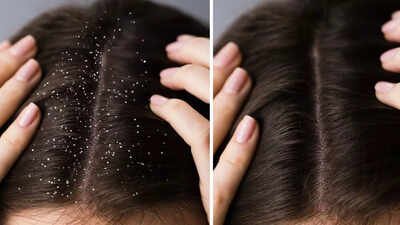
Oily and sticky dandruff is a common scalp problem that leads to greasy hair, persistent flakes, and an uncomfortable, itchy scalp. Unlike dry dandruff, which appears as white, powdery flakes, oily dandruff shows up as sticky, yellowish scales that cling to the scalp and hair roots. This condition can make hair look greasy and unclean, sometimes leaving noticeable residue on clothing or shoulders. Sticky dandruff is often caused by excess sebum production and fungal overgrowth on the scalp, which irritates the skin and triggers flaking. Effective dandruff treatment for oily and sticky scalp includes the right anti-dandruff shampoos, regular hair care routines, and natural remedies to reduce oiliness, soothe irritation, and restore scalp health.
Tips to identify and treat oily and sticky dandruff for a healthy scalp
Oily dandruff occurs when the scalp produces too much sebum, the natural oil that keeps hair and skin moisturised. Excess oil encourages the growth of a fungus called Malassezia, which irritates the scalp and causes sticky flakes. Other factors, such as hormonal changes, stress, weather conditions, poor hygiene, or the use of certain hair products, can make the problem worse. Understanding the underlying cause is important for long-term relief and effective management.
1. Choose the right anti-dandruff shampooSelecting the right shampoo is essential to control oily dandruff. Shampoos that cleanse excess oil while also targeting fungal growth can reduce irritation and flaking. It is important to massage shampoo gently into the scalp to enhance its effectiveness, and avoid harsh formulas that strip natural oils, which can trigger even more oil production. Rotating between different types of anti-dandruff shampoos can also prevent the scalp from becoming resistant to one formula over time.2. Maintain a consistent washing routineRegular hair washing helps prevent the build-up of oil and dirt, which can worsen dandruff. However, over-washing can cause the scalp to produce excess oil in response. Ideally, wash your hair two to three times a week, but in humid climates or after heavy sweating, a gentle wash may be needed more frequently. Always ensure thorough rinsing to remove all shampoo residues, as leftover product can attract more oil and dirt.3. Use a double-rinse techniqueA double-rinse technique ensures a deep clean without over-stripping natural oils. First, apply shampoo to dry hair and massage the scalp to break down oil and product buildup. Then, wet your hair again, lather shampoo directly onto the scalp, and rinse thoroughly. This method effectively removes stubborn flakes and excess sebum while keeping the scalp balanced.4. Incorporate natural remediesNatural remedies can complement medicated shampoos and help soothe the scalp:
- Apple Cider Vinegar (ACV): ACV has antibacterial and antifungal properties and helps restore the scalp’s pH balance. Mix one part ACV with two parts water and use it as a final rinse after shampooing.
- Aloe vera: Aloe vera soothes irritation and reduces redness and itching. Apply fresh gel directly to the scalp, leave it for 15-20 minutes, then rinse.
- Tea tree oil: This essential oil has antifungal properties that help fight the fungus causing dandruff. Add a few drops to your shampoo or dilute with a carrier oil and massage into the scalp.
- Lemon juice: Lemon’s natural acidity helps control oil and flakes. Apply diluted lemon juice to the scalp for a few minutes before washing off.
These remedies not only help reduce dandruff but also promote a healthier, more balanced scalp over time.5. Adjust your dietA balanced diet plays a significant role in maintaining scalp health. Omega-3 fatty acids found in salmon, walnuts, and flaxseeds can help reduce inflammation. Vitamins B and E, present in leafy greens, nuts, and whole grains, support hair and skin health. Limiting greasy or sugary foods can prevent excess oil production, and staying hydrated ensures the scalp remains moisturised from within. A healthy diet complements topical treatments for better results.6. Manage stressStress can trigger hormonal imbalances that worsen oily dandruff. Practising relaxation techniques such as meditation, deep breathing, or mindfulness can help. Regular physical activity like yoga, walking, or light workouts reduces stress levels, while adequate sleep ensures the body and scalp function optimally. Managing stress not only benefits overall health but also contributes to a calmer, healthier scalp.7. Maintain scalp hygieneMaintaining good scalp hygiene is crucial to preventing the accumulation of oil and dirt, which can exacerbate dandruff. Avoid touching your hair frequently, as this transfers oil and bacteria from your hands to the scalp. Keep combs, brushes, and hair accessories clean to prevent grease and debris buildup. Limit the use of styling products, as excessive gels, sprays, or creams can trap oil and flakes, making dandruff more noticeable and harder to manage.8. Avoid excess heat and harsh treatmentsExcessive heat from styling tools or harsh chemical treatments can irritate the scalp and worsen dandruff. Minimise the use of hair dryers, straighteners, and curling irons on high heat. Avoid chemical treatments such as bleaching, perming, or colouring that can damage the scalp. If heat styling is necessary, always apply a heat protectant spray to reduce potential damage.9. Massage your scalp regularlyScalp massage improves blood circulation and can help control oil production. Gently massage the scalp with fingertips for 5-10 minutes daily. You can also use a few drops of light oils such as coconut, jojoba, or almond oil, but avoid applying too much to prevent greasiness. Massaging the scalp can loosen flakes, making washing more effective and promoting healthier hair growth.10. Consult a dermatologist if necessaryIf dandruff persists despite consistent care, consulting a dermatologist is essential. Persistent or severe cases may require prescription-strength antifungal shampoos, medicated creams, or treatment for conditions such as seborrheic dermatitis. Early professional guidance ensures long-term scalp health, prevents complications, and provides personalised recommendations for your specific scalp type.Oily and sticky dandruff can be effectively managed with a combination of consistent care, proper hair hygiene, stress management, a balanced diet, and professional advice when needed. Following these ten steps, choosing the right shampoo, maintaining a routine, using double rinses, natural remedies, diet adjustments, stress control, scalp hygiene, avoiding harsh treatments, massaging the scalp, and consulting a dermatologist can help you achieve a healthier, flake-free scalp.Disclaimer: This article is for informational purposes only and should not be considered medical advice. Please consult a healthcare professional before making any changes to your diet, medication, or lifestyle.Also read | Ways to use hibiscus for healthy hair: Oils, masks, rinses, serums, and natural treatments for hair growth






